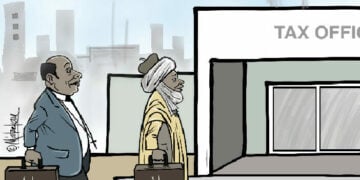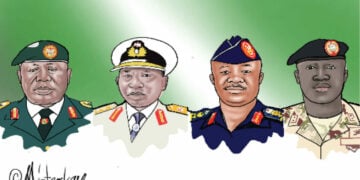The 2025 Democracy Day not only celebrated 26 years of Nigeria’s current unbroken democracy that was inaugurated on May 29, 1999, but also recalls to memory the resilience of Chief MKO Abiola who refused to surrender his electoral victory and paid the supreme price for insisting on reclaiming the mandate that was given on 12th June, 1993 by Nigerians.
The fallouts of some of the issues that featured during the Democracy Day discourse all revealed the inclination by some to portray the unity of the political class in throwing away the chains of military rule.
We must not risk endorsing the single narrative that portrays harmony of forces in the fight against the annulment. While some built a shrine around the June 12 struggles to feast and realise their political ambition, others worked earnestly and sought to ensure Abiola came out triumphantly against forces that were running dogs of the soldiers. While in the night they show themselves as soldiers of democracy, they took the wings of the night to conspire with the military powers to perpetuate their masters in the corridors of power.
Personal Interests
These 26 years have tested the resilience of the citizens against tyranny. Former President Muhammadu Buhari, faced with bleak prospects of re-election, declared June 12 ‘Democracy Day’ in 2018, with the sole intention of wooing South-west votes for victory. Buhari got what he wanted, but he also entombed the memory of a political event that has remained a watershed in the political trajectory of the nation. ‘Democracy Day’ in Nigeria has become an indictment against the political class that has remained the greatest threat to the people.
In the years after the nullification of the presidential poll, some forces have hijacked the June 12 struggle for personal empowerment. The politicians were not united as they were fiercely divided, with even Abiola’s running mate, Ambassador Babagana Kingibe, abandoning the struggle to pitch his tent with General Sani Abacha, who was said to have earlier reached an agreement with Abiola to quickly work for the revalidation of the cancelled poll. When later the winner of the presidential election discovered that he had been tricked into supporting the overthrow of his kinsman, Chief Earnest Shonekan, as Head of the Interim National Government (ING), he quickly beat a retreat to salvage what remained of the integrity of the struggle. Of course, the political arm of the struggle, most especially from the North, had thrown in the towel, and aligned with the military in the hope that further negotiations would be aligned to eventually bring about the revalidation of the June 12 election.
Abandoning Abiola
The failure by the political elite to achieve unity of purpose in galvanising the struggle led to the formation of the National Democratic Coalition (NADECO), headed by the late Chief Abraham Adesanya, with Air Commodore Dan Suleiman, among others, including the incumbent president, who was among the flame bearers for the return of democracy. The aggregation of the various groups in the struggle to actualise the objective of de-annulling the poll would lead to a global outcry and mounting pressure on the military to see the need to hand over power to the civilians.
Deploying a strategic information machinery aimed at exposing the failings of military jackboot, advocates of democracy, as exemplified in the activities of NADECO, would leave no stone unturned to tighten the noose and suffocate the chances of soldiers surviving the strangulating forces of democracy. Even when Abiola declared himself as president-elect, and was abandoned by activists who were alien to the tricks of politicians, the winner of the poll remained unshaken in his resolve to stand to the end until he breathed his last on 8th July, 1998, at the age of 60.
After The Flames
Over 32 years after the military cancelled the polls, the struggle to enthrone democracy has not reached a final bus stop. Though the country has negotiated several curves since May 1999, the journey of Nigeria’s democracy is best summed up in the ideal of June 12 struggle that captures the essence of the Abiola dream of giving hope to a despairing people that were emasculated by long years of military rule.
Now that June 12 is ‘Democracy Day’, should it be an exercise of merely mouthing some of the dreams of the June 12 winner who fought to reclaim his mandate, but met his ultimate death? Beyond the struggles spearheaded by the late newspaper mogul and philanthropist, what have current political leaders done in advancing the dream of Abiola and broadening the frontiers of freedom and prosperity for the Nigerian people?
Harping On Present
President Bola Ahmed Tinubu on Thursday addressed a joint session of the National Assembly where he reiterated his government’s devotion to pursuing policies that would enhance the living conditions of the common man. Apart from announcing national honours for both the living and the dead whose contributions to the current democracy are immense, June 12 has now become a day when the Nigerian President delivers the American equivalent of State of the Union address.
‘Democracy Day’ can only be relevant if it becomes a template in demanding accountability from elected leaders on how far they have gone in delivering the dividends of democracy to the citizens. There’s no better way to honour the memory of MKO Abiola than living up to the improved welfare of the people and prosperity of the nation for which Abiola not only epitomised but paid the supreme price.





